A Step-by-Step Guide for Using Quizzes in Digital Marketing
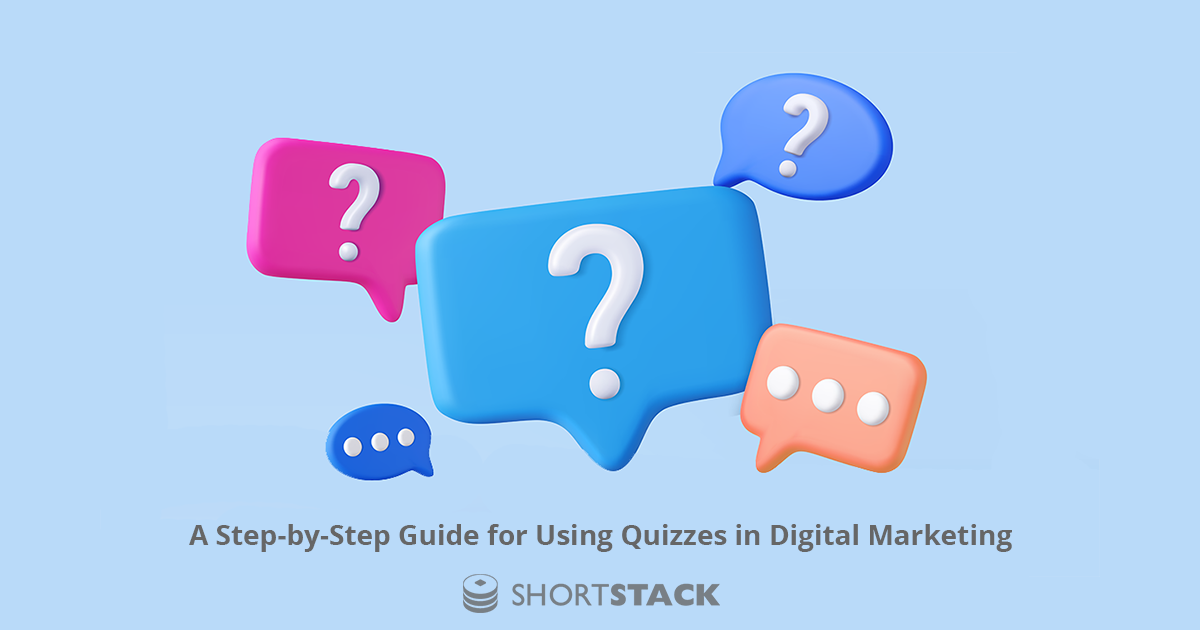
Learn how to use quizzes as a powerful marketing tool to engage social media followers and convert them into loyal customers.
If you've ever wasted an afternoon procrastinating on Facebook, you have probably stopped your scrolling at least once or twice to take a quiz.
Those seemingly silly quizzes are actually a powerful marketing tool - and the perfect way to turn social media followers into loyal customers.
Strategic integration of marketing quizzes with the rest of your digital strategy is the key to success; follow these steps to ensure maximum ROI from your next marketing quiz:
Step 1 - Develop a Purpose and Goals
Your quiz should have some greater purpose beyond simply entertaining random internet users.
Quiz-related goals can vary dramatically based on your company's current marketing needs. If, for example, you intend to amp up the shareability of your content, your quiz could be a great tool for doing so. This Fire Safety quiz from the American Red Cross is strategically positioned alongside a series of Fire Safety resources from their website, for example:
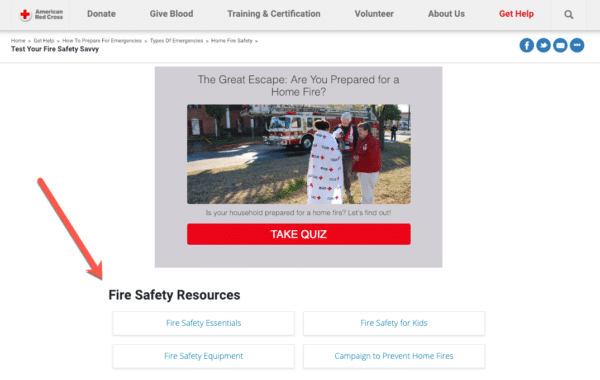
An example of a quiz that promotes content from the American Red Cross.
Alternatively, knowledge quizzes can help to inform followers about what, exactly, makes your brand special, while also identifying you as an authority in your field. For example, this quiz from site News.com.au draws people in with the ego-driven line; “This quick quiz claims you have an IQ of a genius if you can get at least nine of the 10 questions correct.”
They are associating their news site with a highly intelligent audience - or at least those that think they are intelligent - and at the same time positioning their brand in a similar light.

An example of a knowledge quiz.
Quizzes can also be a highly effective tool for converting passive social media followers into leads and eventually paying customers, so this may be a goal that you set. Glasses brand Warby Parker, for example, uses a quiz to engage prospects and recommend the appropriate glasses for their situation:
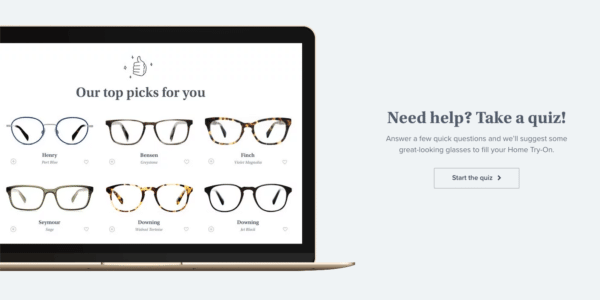
A Warby Parker quiz used for lead generation.
Content amplification, authority-building and lead generation are just three examples of goals you may set for your quiz marketing endeavors.
Step 2 - Identify Your Targets
While some quizzes hold broad appeal, your quiz should not try to entice everybody. After all, from a business perspective, the only people you want completing your quiz are your ideal prospects and customers.
Attracting the right audience for your quiz begins with determining your target market. In most cases, this will closely resemble the general demographics of the customers you typically pursue. Occasionally, however, you may aim to reach a subset of your usual audience that is active on social media or more likely to engage with this form of marketing.
The Sebago Brewing Company, for example, identified that a subset of their target audience were adventure-going dog lovers. So, they created a quiz in partnership with the Planet Dog Foundation:
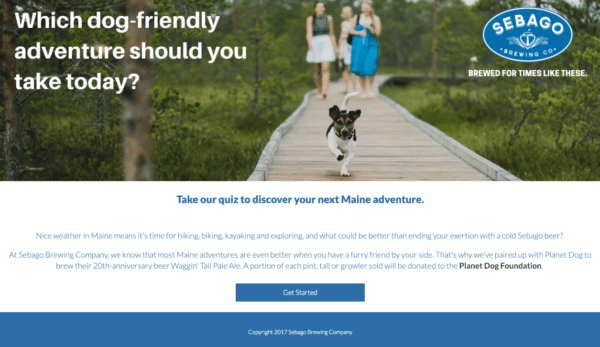
A quiz example targeting an audience segment.
[button size='medium' style='white' text='View and Create Your Own' icon='' icon_color='' link='http://m.lndg.page/kDDv9X?source=www.shortstack.com,shortstack_com,templates' target='_blank' color='' hover_color='' border_color='' hover_border_color='' background_color='' hover_background_color='' font_style='' font_weight='' text_align='' margin='0 0 10px']
Your target audience will ultimately influence the type of quiz you develop and how you promote it.
Step 3 - Choose a Quiz Type
Most marketing quizzes fall into one of two main categories, as detailed below:
Personality Quiz
If BuzzFeed is any indication, internet users adore personality quizzes. These quizzes ask a handful of questions and, based on the results, place participants in one of a few available categories.
The results should clearly explain how the selected category relates to the quiz taker's personality. The struggle, of course, is to develop fresh questions and results that don't look quite like any other quizzes your followers have taken.
Here is an example from JeffBullas.com with the title; “What Type Of Digital Marketer Are You?”:
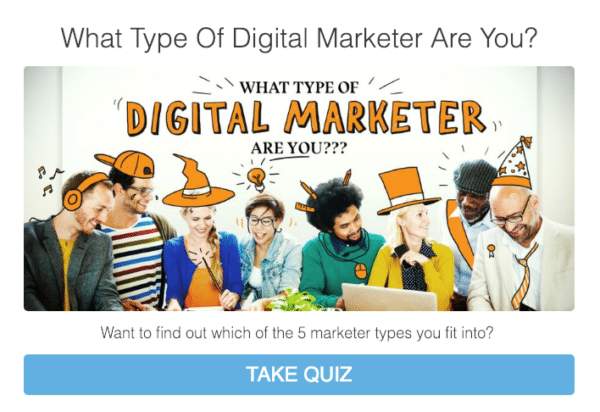
An example of a personality quiz from JeffBullas.com.
Knowledge Quiz
As the name suggests, a knowledge quiz determines how much people know about a certain subject. Often, the user's intent in taking such a quiz is not determining their knowledge, but rather, acing the test and showing off the results to their social media followers.
The below quiz from PlayBuzz.com typifies this style of marketing quiz:

A knowledge quiz from PlayBuzz.com.
Step 4 - Create a Set of Questions
The quiz questions will form the bulk of your content, but don't get too ambitious - not many quiz takers have the patience for anything beyond 10-12 questions.
If possible, incorporate images into these questions; today's highly visual internet users will quickly abandon ship if faced with a huge block of text. Like this quiz from Jarlsberg:
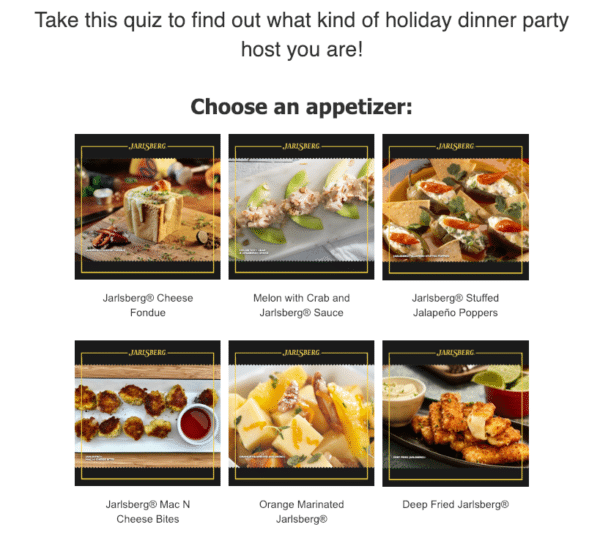
An example of using images as a visual cue in a quiz.
[button size='medium' style='white' text='View and Create Your Own' icon='' icon_color='' link='http://m.lndg.page/kDDv9X?source=www.shortstack.com,shortstack_com,templates' target='_blank' color='' hover_color='' border_color='' hover_border_color='' background_color='' hover_background_color='' font_style='' font_weight='' text_align='' margin='0 0 10px']
Ideally, your quiz's questions will somehow relate to your brand. The link doesn't need to be overt, but participants should complete the quiz with a clear understanding of its purpose and how that relates to your offer.
Question phrasing is critical. Each query should have an engaging voice. When in doubt, draft questions as if you are chatting directly with your audience and run split tests to confirm which approach will be most effective.
Here are some types of quiz questions that tend to perform well:
- They spark curiosity
- They tap into an internal desire
- They challenge participants
- They compare participants to others
Step 5 - Determine How You Will Convert Participants Into Leads
What happens when quiz takers receive their results? If they shrug their shoulders and move on to another digital pursuit, you've lost a huge opportunity to connect with your audience and drive conversions.
For many companies, quizzes form the basis of an effective lead-generation strategy.
Participants may be asked to submit their email address or other contact information in order to receive results.
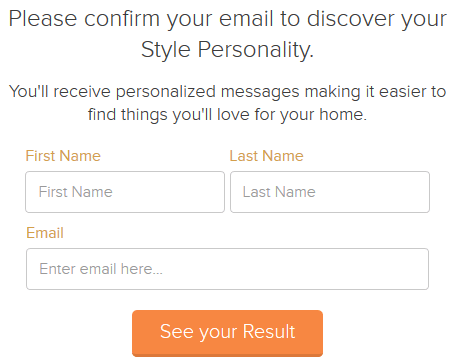
Sometimes, additional incentives may be necessary. For example, quiz completion and contact information submission may lead to significant discounts on your products and services.
Step 6 - Make the Quiz Shareable
As mentioned earlier, many users take quizzes purely because they want to share the results with their followers. Capitalize on this desire by making your quiz shareable on social media. This begins with positive, yet authentic results. An optimistic angle is essential.
In a knowledge quiz, for example, you can emphasize the questions that someone gets right, rather than those they didn’t, helping them understand that their friends and followers could also benefit from this knowledge.
Shareable results should also include attention-grabbing visuals. Remember - internet users are visual creatures. They're far more likely to share quiz results that include vibrant, eye-catching images.
Another interesting tactic for making your quiz shareable is to include the embeddable code below the quiz itself so that viewers can share the quiz on their own website. Here is what that may look like in an example from the Pew Research Center:
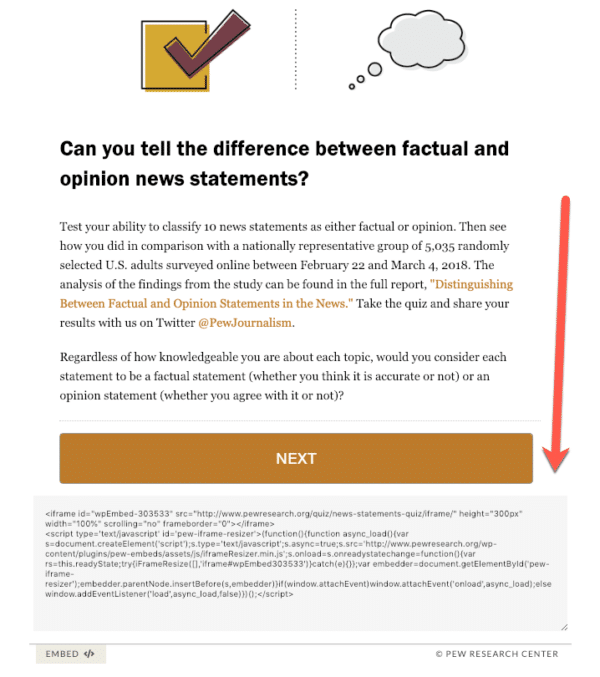
Making a quiz embeddable on other websites.
Step 7 - Promote the Quiz
If you're looking to distribute your quiz, Facebook, Twitter, and your email database are your best friends. Share a link to the quiz with these audiences along with a compelling introductory paragraph and eye-catching visual.
As well, don't be afraid to experiment with paid advertising on Facebook. This approach allows you to target your message to the appropriate audience. A variety of options are available; Facebook’s advanced targeting features can even identify customers based on their profile's recently updated life events.
Step 8 - Follow up with Email Automation and Remarketing
No matter how interested users seem when they take your quiz, they're bound to eventually lose interest and move on to the next big thing. No worries - you can keep them conscious of your brand through automated emails and remarketing.
Keep quiz participants conscious of your brand through automated emails and remarketing.
Begin by thanking followers for taking your quiz in the first place. If you promised an incentive for submitting an email address, your initial message can deliver that reward while also enticing recipients to keep interacting with your brand.

Eventually, it's time to move beyond your quiz and find new ways to engage with potential customers. Send additional emails, perhaps containing links to case studies, interesting videos, or information about the product and/or service that was their result from the quiz. For example, if someone took a quiz on the type of vacation they should take, and their result was a beach vacation, your email could inform them about beach activities, resorts, airline deals, and other relevant offers based on this outcome.
Your goal is to build on the trust you established with the initial quiz and progress participants closer to a sale.
When you're ready to convert, provide an additional incentive. This could be an invite to a free webinar or a particularly impressive discount. The new incentive should get potential customers into your sales funnel, and hopefully, lead to a conversion.
Step 9 - Track Results, Learn and Iterate for Next Time
With marketing quizzes, you can't necessarily expect to get it right on the first try. Chances are, you'll need to make tweaks along the way to ensure you keep quiz takers engaged through every step of the sales funnel. By tracking your results, you can determine where, exactly, you're losing potential sales - and what you can do to increase brand engagement.
Several metrics can be used to track your quiz-based marketing campaign. Shares and retweets can provide valuable insight into brand exposure, but social media interactions only tell part of the story. How many people actually complete the quiz? And how many submit their contact information in hopes of obtaining results?
Other metrics worth considering include website traffic, new email addresses gathered, and, of course, conversions.
Wrapping up
Quiz-based marketing is a lot more complicated than it seems, but the ROI can be considerable.
Don't underestimate the value of a quiz campaign. Given its built-in virality, high engagement levels, and ability to capture key customer information, it could lead to a quick influx of loyal customers for your business.





